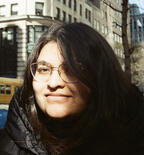Katy Maldonado Dominguez
Katy Maldonado Dominguez was born in Honduras and migrated to the United States when she was seven years old. Her experiences as a Central American immigrant shaped the central question at the heart of her work: How do people find belonging? She uses displacement and belonging as frameworks to understand the way various communities respond to and challenge social, political, legal, and economic systems that disenfranchise them and insist on stripping them of community, place, and identity. She is interested in exploring these themes in the lives of Central American students, undocumented queer parents, migrant caravans, and undocumented scholars. As an interdisciplinary scholar she positions her work at the intersections of Ethnic Studies, Central American Studies, Critical Human Geography, Critical University Studies, and Public Humanities. She received her Bachelor’s Degrees in Chicana/o Studies and Geography from UCLA.
Her dissertation, Displaced Kinship: A Politics of Belonging Among Central American Students, explores how children of Central American immigrants inherit and draw from legacies of displacement to articulate their identities, develop a political consciousness, and navigate higher education. Drawing from 40 interviews with students, she proposes a new theoretical framework she names “displaced kinship” to demonstrate how Central American students refuse to accept the disenfranchisement that displacement creates for their families and communities and in this refusal develop a form of belonging. At its core, her dissertation explores what it means to belong to a community that has been marked by displacement. She is developing a digital archive to accompany her dissertation. Using oral histories and organizing documents, this digital component traces the emergence and history of Central American student organizing in the United States from 1990-2024.
Outside of her dissertation, she has explored similar themes among undocumented queer families. She published a chapter in the anthology We Are Not Dreamers: Undocumented Scholars Theorize Undocumented Life in the United States edited by Leisy Abrego and Genevieve Negrón-Gonzales. The chapter examined how undocumented and queer parents create and navigate families as they resist the twin pressures of xenophobia and homophobia. More recently, she has begun to investigate how undocumented scholars engage with their legal status. In particular, she is interested in understanding the connection between being Central American and being “illegal” in her own life and in the larger Central American diaspora in the United States which is largely undocumented. This has also catalyzed another dimension of her work where she investigates how the Central American migrant caravans of 2018 disrupted the ways we think about migrant mobility and kinship.
